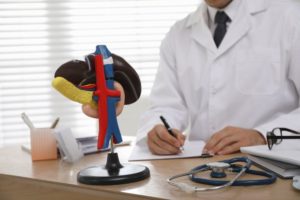Vehicle accidents can be very damaging to the body, from broken bones and an injured back to sprains, lacerations, or even something more serious such as internal injuries. When it comes to internal injuries from a car crash, the liver is the organ more susceptible to damage. Because of its location in the abdominal cavity, the liver is considered a more fragile organ and prone to injury. In fact, car accidents are one of the most common reasons for blunt liver injury, as it can be torn open upon impact. This serious injury should be evaluated right away. If you have been involved in a car accident, it is necessary to seek medical attention right away to be thoroughly evaluated.
Internal Organ Injuries
The tremendous force behind a car accident can cause blunt force trauma to the body. Being thrown from the car, hitting the dashboard, windshield, or steering wheel, or even being jammed into a seat belt can all cause blunt force trauma, specifically to internal organs. There are three main organs that are more susceptible to trauma during a car accident.
- The spleen is located under the left rib near the stomach. If blunt force trauma occurs, the spleen can rupture, causing internal bleeding. Depending upon the damage, sometimes an injured spleen may need to be removed. While it is possible to live without a spleen, the spleen plays an important role in the immune system.
- The kidneys are two bean-shaped organs located below the ribs on either side of the spine. These organs are easily damaged in a car accident because of their position near the lower back. Blood in the urine can be a sign of kidney damage.
- The liver is a key organ in the body that is responsible for such jobs as filtering blood, making proteins required for blood clotting, metabolizing drugs and detoxifying chemicals, and secreting bile. It is located on the right side of the stomach and is the largest organ in the body next to the skin. Because it is such an essential organ, liver damage can be very serious.
Thankfully, the majority of liver injuries can be treated non-invasively.
Liver Injuries From a Car Accident
 There are two ways to categorize liver damage from a car accident, low-grade or severe.
There are two ways to categorize liver damage from a car accident, low-grade or severe.
Low-grade car accident injuries can include injuries such as shallow lacerations, blood clots, or other injuries that don’t require surgery to repair. Severe liver injuries will require surgery and can include deep lacerations, ruptured blood clots, internal bleeding, or ruptured bile ducts. Surgery because of a rupture is crucial, as bile leakage or internal bleeding can be fatal.
Liver injuries can be categorized into two categories, grade 1 & 2 injuries and grade 3&4 injuries. Grade 1 or 2 injuries can include: lacerations less than 1 cm deep that aren’t bleeding, hematomas that are 10 cm or less and aren’t spreading, and stable blood circulation. Grade 3 or 4 liver injuries include a deep laceration that disrupts sections of the liver, loss of blood circulation to the liver, unstable blood circulation, and injuries that cause significant damage to the liver veins and result in heavy bleeding. An estimated 80 to 90% of all liver injuries fall in Grade 1 and 2 categories and can usually be treated non-surgically.
Liver Injuries Risks
During an accident, one of two things may occur, the liver may suffer a contusion, or a bruise, or the liver can be sheared, lacerated, or ruptured. When a rupture occurs, it can cause internal bleeding or leakage of bile, both of which can be very serious health concerns.
Injuries might not be noticed right away but can begin to appear several hours or days later and can cause lightheadedness, bloating, nausea, vomiting, abdominal pain, and more. If you were in a car crash in Marietta and experienced any concerning symptoms, you may have liver damage. Be sure to contact medical professionals right away for proper diagnosis and treatment.
Symptoms of a Liver Injury
Any type of blunt force trauma or penetrating trauma as a result of a car crash in Marietta can cause trauma to the liver. It is important to recognize symptoms of liver damage in order to seek treatment right away. Symptoms can include:
- Tenderness
- Rapid heartbeat
- Fast and shallow breathing
- Pale skin
- Abdominal discomfort
- bleeding
If the liver has been perforated and acidic bile is leaking from the liver into the liver tissue or abdominal cavity, there are other symptoms that may occur, such as:
- Abdominal pain
- Nausea and vomiting
- Irritation
- Abdominal bloating
Diagnosis of a Liver Injury
 Although internal injuries are very serious, they sometimes don’t manifest themselves right away, which is why they can be so dangerous and can be referred to as “hidden injuries.” Liver injuries are considered medical emergencies, and your doctor will want to examine you quickly for blunt trauma hepatic injury. In order to properly diagnosis a liver injury, your doctor may do one or more of the following:
Although internal injuries are very serious, they sometimes don’t manifest themselves right away, which is why they can be so dangerous and can be referred to as “hidden injuries.” Liver injuries are considered medical emergencies, and your doctor will want to examine you quickly for blunt trauma hepatic injury. In order to properly diagnosis a liver injury, your doctor may do one or more of the following:
- Perform a throughout examination, checking to see if the liver is swollen or tender
- Do a blood test to check for internal bleeding. Drawing blood helps doctors analyze liver chemistry to make sure levels of liver enzymes, proteins, and bilirubin are when they should be. It can also tell doctors if you have lost too much blood or if there are enough of the compounds present to help your blood clot properly.
- Utilize high-tech imaging equipment to take a closer look at the liver to determine the extent of liver damage and to check for swelling, tears, bile leakage, or internal bleeding.
○ Ultrasound – a quick and painless imaging scan that uses ultrasound waves.
This test can be helpful in determining if there is significant or active liver bleeding or pooling blood in the abdomen.
○ Angiogram – this test produces an image of the arteries. Contrast dye is given through an IV to help look at blood flow and determine if blood is escaping through tears in the blood vessel walls of the liver.
○ CT Scan – this image shows the insides of the liver to help determine how severe an injury is and to show injuries to the deeper parts of the liver.
- In some instances, laparoscopy may also be conducted to determine if a liver has ruptured
Most of these methods of examination can be performed quickly to determine damage to the liver and the severity of the injury in order to act quickly should it be deemed necessary.
Liver Injury Treatment After a Car Accident
 Treatment courses after an accident will depend upon the severity of the car accident injury sustained. When surgery isn’t required, nonoperative management is considered the normal treatment course. Doctors will monitor heart rate and breathing as well as keep an eye on blood pressure and any active bleeding.
Treatment courses after an accident will depend upon the severity of the car accident injury sustained. When surgery isn’t required, nonoperative management is considered the normal treatment course. Doctors will monitor heart rate and breathing as well as keep an eye on blood pressure and any active bleeding.
If you sustained a liver contusion, this is a relatively minor injury that can heal over time with rest. Liver injuries that don’t require surgery will often heal themselves without complications. For these mild injuries, time for healing and close monitoring is usually the course of action most recommended. More moderate to severe liver injuries might require surgery to stop bleeding and further liver damage. Angioembolization can be used to help control bleeding. Resuscitative vascular balloon treatment, when a balloon is placed into the aorta, can also be helpful in managing hemorrhaging. If surgery is required, a more comprehensive treatment plan might be necessary. Work with AICA doctors in Marietta to create a comprehensive treatment plan from diagnosis and treatment through to recovery that will ensure you receive quality care after a car accident injury.
Self-Care After a Liver Injury
Because most liver injuries simply require rest and time, there are several self-care methods that can help you receive the most bang for your buck from your time of healing. Get plenty of rest and allow your liver ample time to recover. Don’t try to get back to normal life too quickly. Avoid alcohol as it could put unnecessary strain on your liver. Limit non-prescription medication as it can also place strain on the liver to break down such medications. Ask your doctor for more information about what medications you should be taking and what you can do for self-care to help in the recovery process.
The bottom line is car accidents are dangerous and can lead to liver damage, unbeknownst to you. Seek medical treatment if you have suffered from any kind of blunt-force trauma to the upper right abdomen. The sooner you seek medical care, the quicker you can minimize potential complications.
If you or a loved one have suffered from a car accident injury to the liver, find comprehensive care at AICA in Marietta. Our expert medical professionals have experience with diagnosing and treating car accident injuries. Find treatment and care all in one convenient place. Contact our offices today to schedule an appointment to be on your way to recovery and healing.